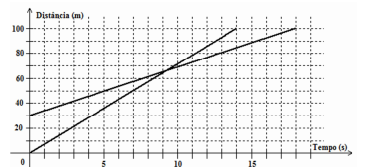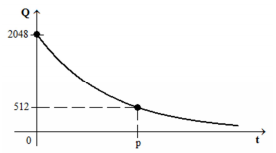Questões de Vestibular PUC-MINAS 2013 para Prova - Medicina
Foram encontradas 70 questões

Com base nos dados desse gráfico, foram feitas três afirmativas:
I. ( ) Entre o nono e o décimo segundos, Rafael ultrapassou Sofia. II. ( ) Para percorrer 100 m, Sofia demorou 18 segundos. III. ( ) Para percorrer 70 m , Rafael demorou menos de 10 segundos.
Assinalando-se com V cada afirmativa verdadeira e com F cada afirmativa falsa, obtém-se a seguinte sequência, ordenada da primeira para a terceira:
A eficiência de anúncios num painel eletrônico localizado em certa avenida movimentada foi avaliada por uma empresa de propaganda. Os resultados mostraram que, em média:
• Passam, por dia, 30 000 motoristas em frente ao painel eletrônico.
• 40% dos motoristas que passam observam o painel.
• Um motorista passa três vezes por semana pelo local.
Segundo os dados acima, se um anúncio de certo produto ficar exposto durante sete dias nesse painel, é esperado que o número mínimo de motoristas diferentes que terão observado o painel seja:

Considerando-se os dados desse processo de decomposição mostrado no gráfico, o valor de p é: